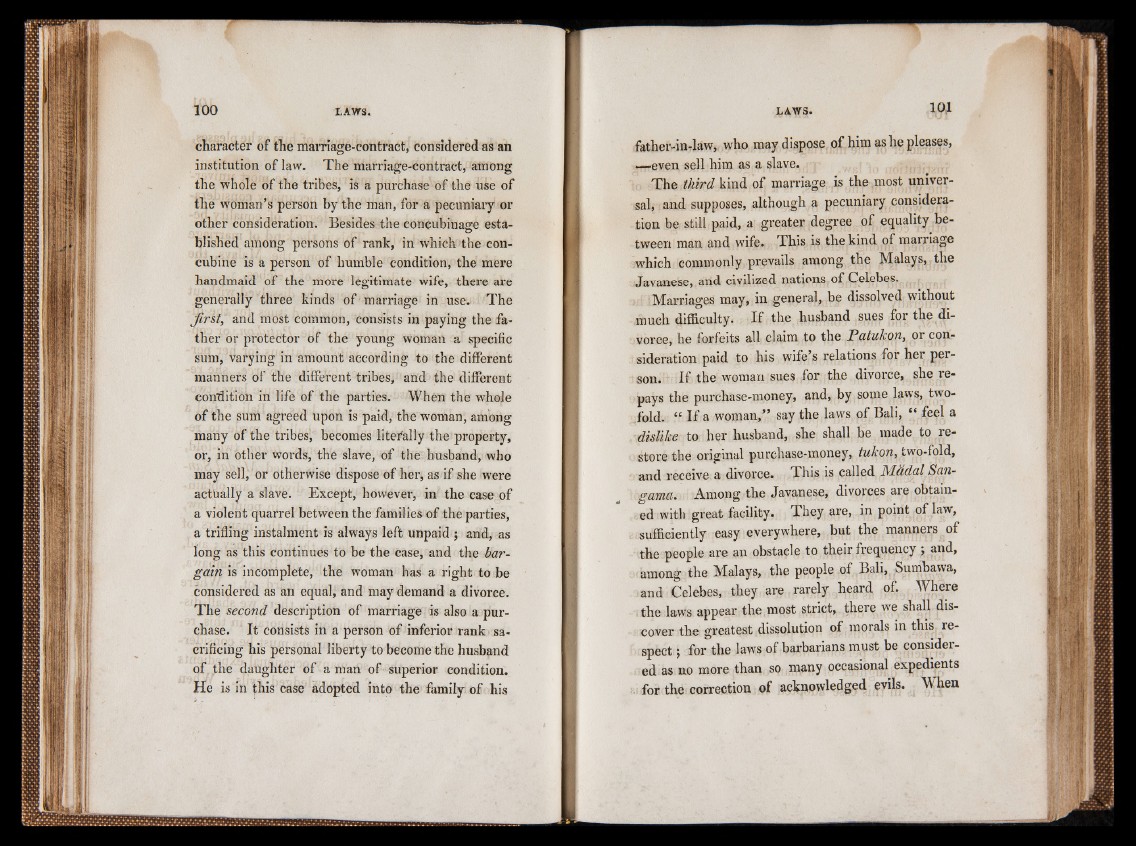
character of the marriage-contract, considered as an
institution of law. The marriage-contract, among
the whole of the tribes, is a purchase of the use of
the woman’s person by the man, for a pecuniary or
other consideration. Besides the concubinage established
among persons of rank, in which the concubine
is a person of humble condition, the mere
handmaid of the more legitimate wife, there are
generally three kinds of marriage in use. The
first, and most common, consists in paying the father
or protector of the young woman a specific
sum, varying in amount according to the different
manners of the different tribes, and the different
condition in life of the parties. When the whole
of the sum agreed upon is paid, the woman, among
many of the tribes, becomes litefally the property,
or, in other words, the slave, of the husband, who
may sell, or otherwise dispose of her, as if she were
actually a slave. Except, however, in the case of
a violent quarrel between the families of the parties,
a trifling instalment is always left unpaid ; and, as
long as this continues to be the case, and the bargain
is incomplete, the woman has a right to be
considered as an equal, and may demand a divorce.
The second description of marriage is also a purchase.
It consists in a person of inferior rank sacrificing
his personal liberty to become the husband
of the daughter of a man of superior condition.
He is in this case adopted into the family of his
father-in-law, who may dispose of him as he pleases,
—even sell him as a slave.
The third kind of marriage is the most universal,
and supposes, although a pecuniary consideration
be still paid, a greater degree of equality between
man and wife. This is the kind of marriage
which commonly prevails among the Malays, the
Javanese, and civilized nations of Celebes.
Marriages may, in general, be dissolved without
much difficulty. If the husband sues for the divorce,
he forfeits all claim to the Patukon, or consideration
paid to his wife’s relations for her person.
If the woman sues for the divorce, she repays
the purchase-money, and, by some laws, twofold.
If a woman,” say the laws of Bali, “ feel a
dislike to her husband, she shall be made to restore
the original purchase-money, tukon, two-fold,
and receive a divorce. This is called Madal San-
gama. Among the Javanese, divorces aie obtained
with great facility. They are, in point of law,
sufficiently easy everywhere, but the manners of
the people are an obstacle to their frequency ; and,
among the Malays, the people of Bali, Sumbawa,
and Celebes, they are rarely heard of. Where
the laws appear the most strict, there we shall discover
the greatest dissolution of morals in this respect
; for the laws of barbarians must be considered
as no more than so many occasional expedients
for the correction of acknowledged evils. When